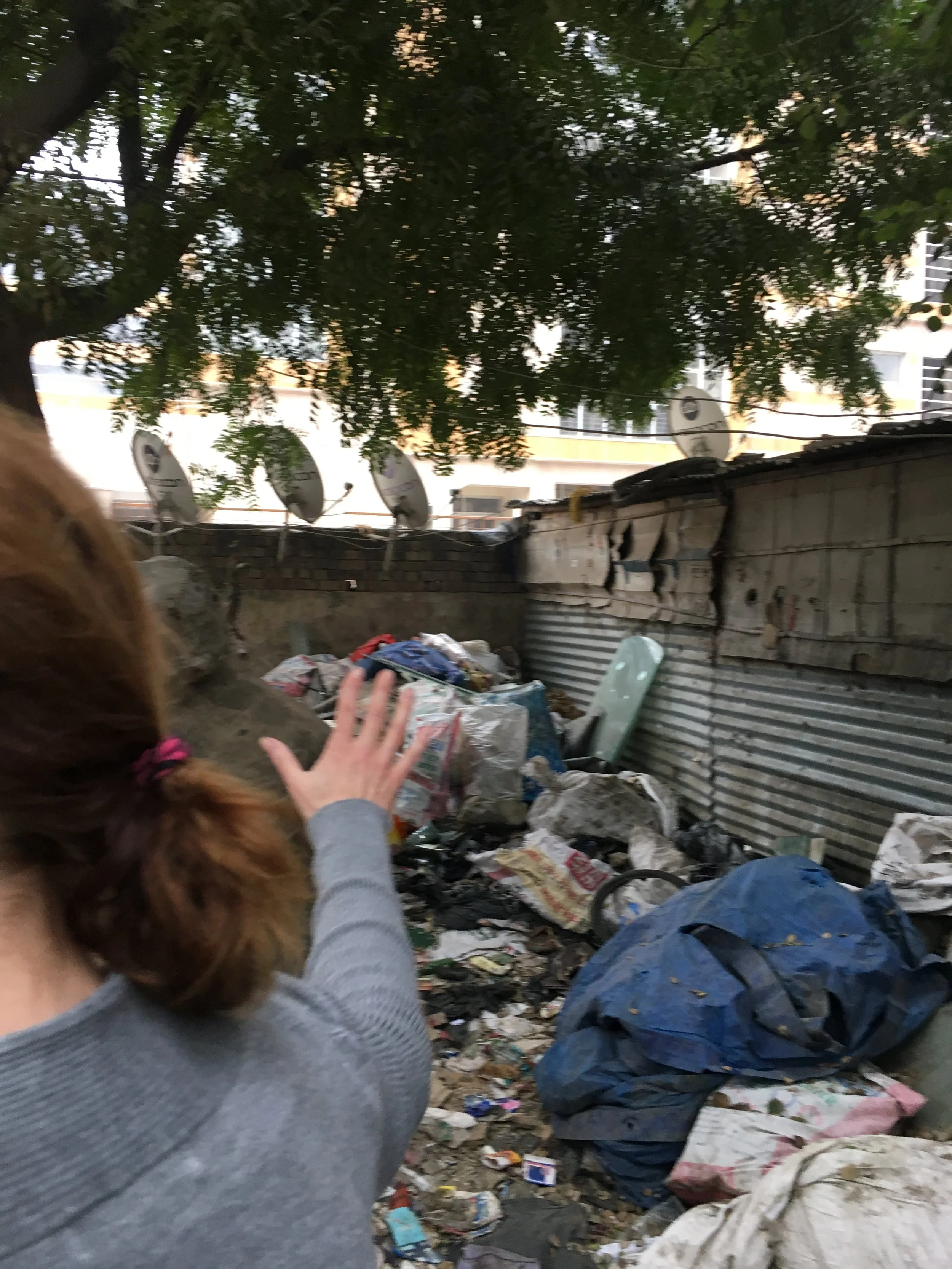The Story of BBI - How We Began
BBI Beginnings
Cook Fire Beginning
Me with Stella interpreting to my right.
The cook fire beginning.
Beautiful Balance Inspirations began around a small cook fire in a slum of Delhi, India. The air was heavy with cook fire smoke from the 100 + families that lived in the slum. Each family unit had a small cook fire at the opening of their shanty. Shanties were pieced together with metal sheeting and a variety of construction materials like old wood framing and some homemade bricks. The large number of small fires made much more smoke than you would have thought possible. The smell of spices cooking in the meals over those fires, mixed with body odor, sewage, and cow dung, woke up the palate and made you aware that you were out of your American element of ease and comfort.
The sounds of the busy streets surrounding the village had diminished. No more loud beeping horns of the heavy traffic. Just the hum of family conversations could be heard. A few scampers of curious children running up and then away.
This was a rag picker slum. Rag picker is the term used in India for those relegated to picking up trash, mostly recyclables, to eke out a living on reselling those recyclables for daily food. The poorest of the poor, lowest class of Muslim immigrants in the area made up this particular slum village. They had come in hopes of a better life. The labor jobs they sought out didn’t always pan out. High piles of various sorted recyclable garbage were everywhere. Every day the rag picker families would scour their area of Delhi and pick up garbage, in hopes of selling some of the recyclable cardboard, bottles, and plastics to earn enough funds for daily food.
Daily Bread in exchange for the mountain of recyclables
that sustains the villagers.
I was seated on a cold stone next to the tiny cook fire. The fire produced just enough heat to warm the family meal. I would have relished a bit more heat because the air and ground were freezing. The time of year was January 2019. The cold came with the blessing of not having to smell quite as much of the body odor as one could have. Surrounding the little fire with me, were five lovely young ladies and my friend, Stella, who was also my interpreter. I learned through Stella conversing for me, that all the ladies were in fact, young girls, ages 11-14. All were married and all, but one had a little baby or toddler in tow.
The girls were funny and endearing with their quick smiles and questions about why a white woman and her family would be trooping around their poor village. They were proud of their married state and affirming ability to have children. They were happy to have Stella in their lives, encouraging them to be good mothers, by attending health care classes and sewing classes.
Sharing stories that connect and bind us.
These young ladies were industrious and shared the whole breakdown of how their village life worked. Everyone had a role in the rag picker village, from heads of families to the littlest child. These ladies were looking to make a better life for the next generation.
Standing on the outer rim of this little circle was my adopted Indian daughter, Sheena, age 18, my oldest daughter, Caitlin, age 23 and my husband Russ. The birthday, senior trip for Sheena was more than just a heritage excursion through the country of my heart. It was an intentional eye-opening journey that I had planned for my family.
I had loved India from early childhood. Reading Rudyard Kipling’s, The Jungle Book, piqued my interest. Missionary stories of Amy Carmichael and William Carey fueled my desire to go there one day. I also had a lovely best friend in elementary school from India. She was whisked away abruptly when her father became a Christian. Her mother’s family was Hindu and had no tolerance to allow her to be raised by a convert. It intrigued me back then and made me ask a lot of questions about different religions and particular cultural practices.
My dear family observed intently my interactions and conversations with the girls. The unbelief on my girls’ faces was apparent when they heard the ages of the girls. My happy and single daughters were jilted into culture shock. Shock of abject poverty, filth beyond reason, child brides and babies to boot! All that I tried to prepare them for was of no use. My three previous mission trip to India and retrieval of our daughter could never fully be conveyed though conversation.
You must experience it for yourself. A piece of your heart is torn out. Your soul screams loud and clear into your head of reason-“DO SOMETHING!”
Getting my tour of how the garbage sorting works.
So that is what we did. Within three months of Sheena’s heritage mission trip my girls pushed until the “Do something”, became a reality. Beautiful Balance Inspirations was officially born after asking 10 lady friends if they would support and sponsor, my friend, Stella’s, little tutoring, and non-government organization, Unnati Ki Rah, in the middle of that slum in Delhi. They all agreed, and we began transferring funds even before BBI was a registered 501c3 nonprofit on August 26, 2019.
My family standing outside of Unnati Ki Rah center
with some of the tutoring students.
Beautiful Balance Inspirations would focus on education, healthcare, and micro finance opportunities. We would let God’s love and guidance move us into action. Families were to be loved above all, no matter their ethnic or religious backgrounds, no matter their cultural differences in marrying age. We would count it a victory to encourage families to let their girls finish high school before marrying. We would do all that we could to give poor families a chance to learn a skill and make a living even if they did not have an education. We would partner with local, native born leaders who knew the best ways to care for their own people.
The nonprofit status was granted on August 26, 2019. My parents’ anniversary date. I am sure they would have approved of doing good across the world. Shortly after getting everything prepared to send funds to Stella regularly, I submitted a mission center that I had been supporting from Romania for board approval. They were doing the same work as Stella, only in the slums of Galati, Romania. My husband and I had both visited the work and had been supporting since the early nineties. The board agreed and Bethesda Foundation was added to the partnership with BBI.
Bethesda Foundation, Galati, Romania
In September of 2019, family friends visited with their proposal for support as they were headed to Liberia, Africa to work on the mission field with Beulah mission center. The board approved to support the work of the local Liberian Pastor and his wife, David, and Wilma Snydler. They did not support the young American couple. They kept to the beginning vision of BBI, supporting native citizens in their own work among the poor. This vision allowed the BBI funds to stretch beyond the normal scope of supporting transplanted missionaries who were not native and did not know the local languages.
So, by the Fall of 2019, BBI was supporting the work of three world centers who were all engaged in education, microfinance, and health care among the poorest people in their local areas.
Beulah Mission Center school, Liberia, Africa.








